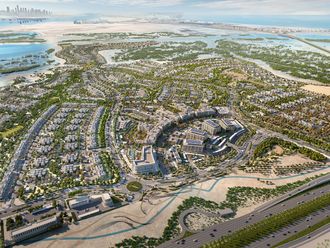Dubai: Mortgage lenders are getting far more generous with their disbursal, signing off on Dh3.8 billion in May and up from April’s Dh2.5 billion on property deals in Dubai. These numbers in turn suggest that end users remain quite active in generating transactions and that prospects of the property market do not hinge on cash-ready investors alone.
The bulk of the mortgage-supported deals involve ready properties or those that are closing in on completion. Details are not available on the average size of the mortgage deals, but the bulk of these would be mid-ticket properties.
Moreover, with a fairly sizeable number of off-plan projects in advanced stages of development, the second-half of the year could be just as busy for home financiers.
“We can surmise the growth rate should increase with the large number of handovers being lined up in the coming months, wherein mortgages can be availed for final payments due to the developer,” said Dhiren Gupta, Managing Director at 4C Mortgage Consultancy. “Mortgage is certainly gaining due to enhanced end-user interest and prominent product offerings.
“Offered rates on residential finance still starts from 2.99 per cent and if we consider commercial finance rates, they are around 5 per cent and upwards.”
Brexit
These home financing rates are as good as they get. And with Brexit a reality and the recent weaker growth numbers for the US economy, the Federal Reserve is unlikely to rush a base rate hike any time soon. That means for UAE’s home buyers, shopping around for a favourable deal from banks makes sense.
With their small business lending and trade financing in a bit of turmoil, local banks need to maximise opportunities on the retail side of their business. The growth is unlikely to come from credit card based sales, what with UAE consumers keeping a tight rein on their spending habits.
So, banks will have to push their chances in mortgage funding. According to Mohammad Shaikhani, Managing Director of Shaikhani Group, “There is a lot more lending support to end users from banks as long as two key documents are provided.
“One, developers must have their “building completion certification” ready and, two, the property buyer must have registered with “Oqood”. With these two documents provided for, chances are that the mortgage approval can be had within four weeks. That’s a fairly speedy disbursal rate given all the checks and balances banks need to go through.” (Oqood relates to the mandatory registrations buyers must do on off-plan purchases.) The Shaikhani Group — which has multiple projects on at Jumeirah Village — has tie-ups with three banks to offer lending. “It’s no secret that having banks on board is definitely a big help for developers in the selling process,” said Shaikhani.
A point echoed by Ranjeet Chavan, Partner at the brokerage firm of SPF Realty. “If a developer is empanelled by the banks, it makes the whole process of connecting a buyer to a lender very easy. It means banks trust that developer’s credentials and willing to have exposures on the properties.
“But the property buyer must sill put up 50 per cent of the property value as equity, while the developer must show he has paid for the land in full and furnished a 20 per cent bank guarantee on the project. These are non-negotiable pre-requirements for banks to offer mortgage.”
Construction milestones
How does this “empanelling” of developers work? Since not every bank finances sales in off-plan projects, they instead have a list of developers with whom they enter agreements for mortgage support once key construction milestones are reached. “Usually to evade potential risks, they are extending mortgage approvals to only those projects that are registered under the master-developers list in Dubai,” said Gupta.
A reality check on those extended post-handover payments
Many a developer has been offering off-plan properties where a major percentage of the paying off can be done after handover. These attractively packaged offers have played a large part in reviving investor interest in off-plan launches.
But Dhiren Gupta of 4C Mortgage Consultancy suggests property buyers should still do some number crunching.
“In an off-plan purchase, mortgage comes into place only once initial 50 per cent is covered by the buyer and secondly when the developer achieves defined construction milestones,” Gupta said. “With the developer’s self-financed payment option, the buyer’s need for mortgage gets deferred even after the handover.
“To some extent, post-conferral payment plans entice investors as they give options to pay over a (longer) period. However, if we take a close look, these outlays are quite immense based on the repayment schedule, which may stress the buyer’s financial planning.”











